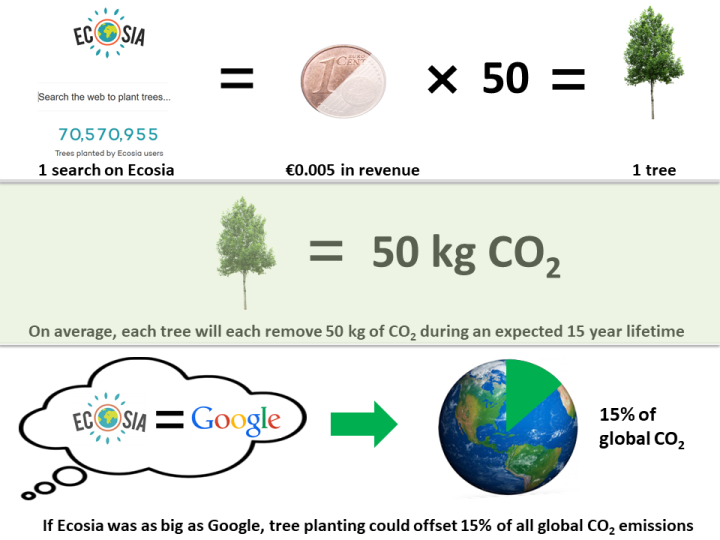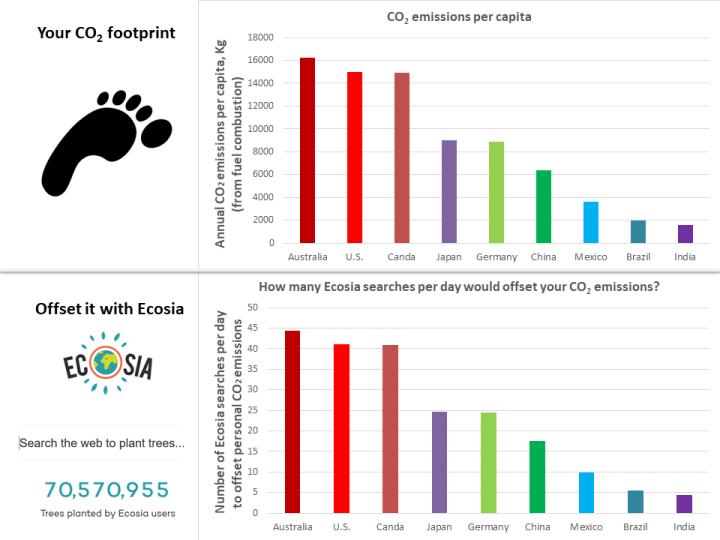Ecosia is a green internet search engine that uses revenue from advertising to fund tree-planting projects. In the last post I looked at deforestation in the Amazon and some simple actions that we can take to help ensure their safety. Switching to Ecosia appears to be one of the easiest ways to immediately start supporting reforestation projects. So, let’s take a look at the ethics and utility of Ecosia in more detail. Faced with the suggestion of switching to Ecosia for web search, most people have the following two questions:
- Is Ecosia more ethical than Google?
- Is Ecosia good-enough for most internet search purposes?
I’ll answer the first question in the form of a Green Stars review.
How ethical is Ecosia?
The Green Stars rating looks at various social and environmental factors to award an ethical score.
I’m awarding Ecosia a score of 5/5 Green Stars for social and environmental impact based on the following:
- Ecosia uses 80% of revenue (after operational costs) to fund tree-planting operations.
- Advertising revenue from around 45 searches is sufficient to fund planting of one tree.
- It’s certified by B-Corporation for social and environmental impact, with a good score of 113.
- Ecosia’s servers are powered by company-owned solar plant.
- These solar panels produce twice the solar energy required for search; excess electricity is supplied to the grid.
- They do not use tax-avoidance strategies, unlike most other tech companies.
- Ecosia has better privacy terms and supplies fewer ads than major search engines like Google.
I think that’s sufficient detail for a Green Stars review, which, like my other reviews, I will post online (in this case, on Ecosia’s pages on Google Play, Apple Apps, Google maps, Facebook, etc.). That’s how the Green Stars Project works – raising awareness about ethical consumerism via online reviews that include ethical ratings. For the purposes of this post, I’ll provide a little more detail on the points above.
Ecosia – social and environmental impact
Ecosia is a social business that uses most of their revenue to plants trees – just think about that for a moment and compare to Google, which has become one of the largest corporations on the planet in large part due to revenue from advertising. Even with their small share of the internet search market, Ecosia has funded the planting of over 70 million trees. If Ecosia were to become as big as Google, the projected impact would be staggering: enough trees to capture 15% of global CO2 emissions (that’s roughly equivalent to capturing emissions from all road vehicles). Founder Christian Kroll has made legally binding agreements to make sure that their mission doesn’t change and that he can never sell Ecosia.

They are serious about what they do and everything that I’ve read about them online has been positive (including this Snopes investigation into their tree-planting activities). They have received a good score from B-Corporation, which is always a good certification to look out for when investigating company ethics. Ecosia publishes monthly financial reports detailing their income and contributions towards tree planting projects which vary over time – they started out in the Amazon with the WWF and currently fund projects based in Ghana and Burkina Faso.
The carbon footprint of internet search
There has been some confusion generated by a few people online (e.g., on Quora) suggesting that Ecosia is less green than Google. It’s based on an argument that Ecosia’s search algorithm is adopted from Microsoft Bing and therefore has a larger carbon footprint than Google’s. However, even though Ecosia’s search does partly rely on Microsoft’s servers (as well as Ecosia’s own solar-powered servers), the fact that Google is a little closer to carbon-neutrality than Microsoft pales into insignificance compared to the impact of tree-planting. Here are some numbers to explain this:
- The carbon cost of a single web search: around 0.2 grams CO2, according to Google.
- Carbon saved by tree-planting funded by Ecosia: 1 kg CO2 per search.
- So the carbon captured from Ecosia-funded tree-planting is 5000-times greater than the footprint of a search.
The carbon footprint of internet search is not that high at any rate – going by Google’s number, the search footprint of an average user (~ 130 searches per month) is only around 0.3 kg CO2 per year. However, if that user uses Ecosia for search, they will have funded planting of 35 trees per year, which would capture over 1500 kg CO2 as they grow. (The carbon-footprint of video streaming, on the other hand, is much larger – and a topic for a future post.)
To me, the impact of this simple tree planting model is staggering. The charts below show how using Ecosia for daily web searches can offset a surprisingly large amount of your carbon footprint.

Broader impact: Ecosia versus Google
One lesson from the section above is that it’s important to look beyond just one metric, when looking for an ethical product (such as a green search engine). Google may have covered the carbon cost of their servers but is not so responsible in other ways – for example, having a fleet of aircraft and a private airport. Also, Ecosia make a point of paying their taxes, because taxes contribute to the essentials of society: schools, hospitals, public transport, etc. That’s how a society is supposed to work, after all. Google (and most other multinational companies, for that matter) go out of their way to avoid taxes. For example, in 2016 the Guardian reported that Google paid €47m in tax in Ireland on €22bn in sales revenue – that’s a tax rate of 0.2% of revenue, while the rest of us pay tax at a rate of maybe 30% on earnings. There are other aspects of the debate on Ecosia versus Google (and other search engines) that have been covered in other articles: for example, this useful review article outlines how Ecosia respects your privacy more and also does not bombard you with as many ads as Google and the other major search engines.
Ecosia functionality and features
This has been covered quite a bit, so I’ll keep this section brief. Internet search is important to me and I’ve had no major issues with Ecosia so far. Very often, when we conduct a web search, we are really just looking for one specific website. For example, you might search Meryl Streep with the goal of getting to the Streep’s Wikipedia or IMDB page. For most search engines you will see these sites on page one, so you can rely on them for this role: essentially a stepping stone to the site that you already know you want. And for cases where you want to search on Google you can still do that, of course – and you can go there in one step from Ecosia by using a search tag.
Using tags on Ecosia
If you are using Ecosia as your default green search engine and want to switch to Google for a specific search then just include the tag #g after your search term and Ecosia will bring you directly to the Google search results for that term. There are other useful tags too. For instance, searching Meryl Streep #w will take you directly to Streep’s Wikipedia page, Meryl Streep #yt brings you directly to search results on YouTube, and San Francisco #m will take you directly to the Google Maps page for SF. Here’s a list of other shortcut tags from Ecosia.
Ecosia Travel
A quick note on one of their newer features that allows you to contribute towards tree-planting through everyday activities: Ecosia Travel. If you use Ecosia’s travel page to book a hotel, Ecosia will apply their commission to fund forestation projects, with an average of 25 trees planted per booking.
Bottom line: Is Ecosia a green search engine?
Short answer: Yes! Consider switching. There are actually few things in life that will have such a large impact with such little effort. I use Ecosia for most purposes and use the #g tag after my search term for any searches that I’d like to run on Google.

I use Ecosia and find it really good. On the odd occasion I have to use Google but generally I get all I need from Ecosia.
LikeLike
That’s good to hear – especially since you do a lot of online research!
LikeLike
Thank you for this! I hadn’t heard of Ecosia until reading your post. I was using DuckDuckGo, which is good compared to Google – but I have now switched to Ecosia on both of the browsers I use. Nice when something I do multiple times every day can actually contribute actively towards the good of the planet.
LikeLike
That’s great! I’ve never used DuckDuckGo – I hope you’re able to get where you need to go as easily on Ecosia.
I find it fine for 99% of my needs.
LikeLike
So this is probably a very silly question, but how do I even use Ecosia as a search engine?
LikeLike
Hey Pam. Good question!
The simplest way on a computer is to just set your browser home page to https://www.ecosia.org/
For more convenience you can install an extension (add-on) on browsers like Firefox or Chrome so that it becomes your default search engine. Ecosia provides details for doing this on Safari and there are links to the Firefox and Chrome extensions on that page also. For your phone, you can install the Ecosia app or could even just create a shortcut on your home screen to the Ecosia homepage (https://www.ecosia.org/).
LikeLike
Thank you so much!🤓
LikeLike
You’re welcome!
LikeLike
🤓
LikeLike
Glad to be of help!
LikeLike
Hello,
I’ve added the extension and have started using Ecosia, and I think its one of the best ideas I’ve heard for a long time.
I wonder if you are able to clarify something for me?
Do I actually need to be clicking on the paid advertisements for them to receive revenue? Or do they get some revenue from me just seeing the links to the paid adds (and therefore go towards a tree) even if I scroll past the paid adds and click on an unpaid link?
I was thinking I might spend a little time each day searching for anti-environmentalist stuff, and so getting them to pay for the trees haha. But do I need to be clicking on paid adds for this to happen?
LikeLike
Hi David. Good question. Here’s what Ecosia says on the subject: “Even if you use an ad blocker or never click on ads, you still contribute to the movement by increasing the number of Ecosia users. The more monthly active users Ecosia has, the more relevant it becomes to advertisers.”
So you’re still supporting them even if you rarely or never click on an ad. I rarely click ads but for sites that I’m going to go to anyway (e.g., I’m thinking of buying shoes from Etiko soon) I’ll probably access the website thru and add rather than a direct link.
LikeLike
I use Ecosia on my phone as my default for all internet searches. If I don’t find what I need there then I do a Google search. Very happy with this excellent Greener option
LikeLike
Nice to hear that, Amanda!
Yep, it’s fine for most searches when you already have an idea of what you’re looking for.
LikeLike